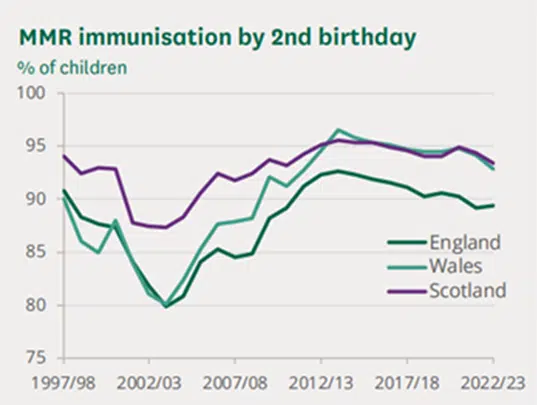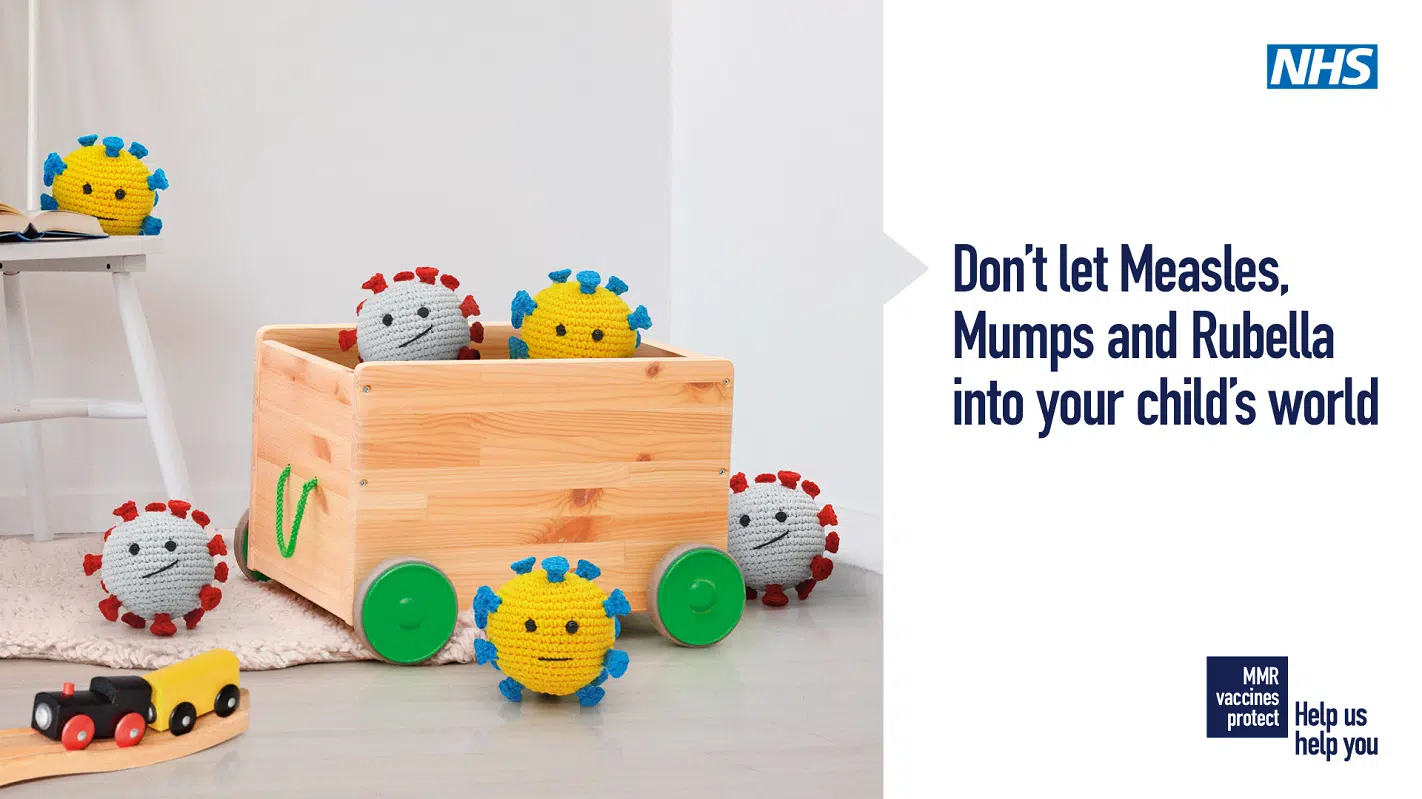As highlighted by Professor Helen Bedford in the February 2024 iHV podcast “Stemming the measles surge”, measles is on the rise in the UK, with 6/10 of the confirmed cases in the under 10s in England1.
At the same time, rates of MMR vaccination continue to decline2, this can be seen in the graph below, which highlights the recovery in MMR vaccination uptake, following the discrediting of the Wakefield study. However, from 2019/20 the rates start to fall again. In 2022/23, for the uptake of both doses, this had fallen to 84.5% in England, 89.5% in Wales, 90.2% in Scotland and 87.9% Northern Ireland, all of which are below the World Health Organization (WHO) target of 95%2.

There are a number of reasons why parents choose not to have their children fully vaccinated against MMR. In some cases, there is a lack of awareness of the potential severity of measles, mumps and rubella if contracted. For some parents, vaccination appointments are delivered in locations that are not easily accessible for them, with limited choice or flexibility around timings to make sure that they are available at convenient times for busy families. Some parents may also be anxious about the MMR vaccine and its side effects.
It is therefore important that all families have access to accurate information and opportunities to have their questions answered by trusted health professionals.
New Video
iHV and Barnardo’s have worked together to develop a film for families about the MMR vaccination to improve vaccine uptake. It features a real-life couple, Radhika and Manish, discussing their decision to get their son, Kabeer, vaccinated and their experience of the process. They share their initial challenges finding trusted information online, and the importance of vaccination, not only for their own child but for vulnerable family and friends at greater risk of serious complications linked to these diseases. They also strongly advise parents who may have doubts about the MMR vaccine to talk to a health professional, such as their health visitor or GP, who can provide trusted and evidence-based advice. A lovely moment in the video is hearing them describe how proud their son Kabeer was of his vaccination certificate, as he showed it to his friends at nursery.
The video is freely available on the link below, so please share with families and on your social media.
Health visitors’ vital role
When discussing the MMR vaccination with families, as well as encouraging them to have their child/ren vaccinated, it is important to remind them that:
- Unvaccinated children are at high risk of contracting measles, mumps and rubella – these are all potentially serious diseases that can cause significant health problems.
- Measles can lead to pneumonia, meningitis, blindness and seizures in children; and miscarriage, stillbirth, premature birth or a baby born with a low birthweight in those who are pregnant3.
- Mumps can cause viral meningitis, although serious complications are thankfully rare4.
- And while rubella is rare in pregnancy, it can cause miscarriage and serious problems in the baby including with their sight, hearing, heart or brain5.
- There is a measles surge in the UK now – it is never too late to get their child vaccinated to protect them and the wider community.
Health visitors and the wider skill-mix team have a vital role to play in improving vaccine uptake. Please use every opportunity to support families to check their child’s vaccine status, answer any questions that they might have with accurate information, and connect families to their GP, or local vaccine initiatives in your area, to promote vaccine uptake.
RCPCH resources
The Royal College of Paediatric and Child Health has some great resources about measles which you can access here.
References
- UKHSA (2024) News story Latest measles statistics published.
https://www.gov.uk/government/news/latest-measles-statistics-published - Harker, R. (2024) Childhood Immunisation Statistic. House of Commons Library. Number 8556. https://researchbriefings.files.parliament.uk/documents/CBP-8556/CBP-8556.pdf
- NHS (2022) Measles.
https://www.nhs.uk/conditions/measles/ - NHS (2021) Mumps.
https://www.nhs.uk/conditions/mumps/ - NHS (2022) Rubella (german measles).
https://www.nhs.uk/conditions/rubella/



